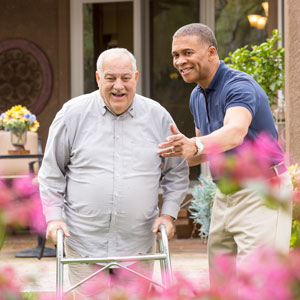How Occupational Therapy Can Support Aging In Place

Home is comfortable. It is familiar. It holds memories. That is why it should come as no surprise that many seniors prefer to stay in their own homes for as long as possible. With the right modifications, accommodations, and support, older adults can safely age in place. Occupational therapists (OTs) can assist families in creating an environment that better meets their loved one’s needs and abilities, while also helping seniors execute different activities of daily living.
Working Within the Home
If you are concerned about your aging parent’s safety at home, have an OT come in and conduct a basic home assessment. They can evaluate your loved one’s ability to navigate around different rooms, access items they need, and complete daily tasks. As they observe or ask them to do a variety of things, the OT can also identify any obstacles or barriers that may be impeding their success.
Following their evaluation, the OT can provide recommendations for:
- Modifications to the home such as grab bars, stair lifts, lower counters, lever-style door handles, or improved lighting.
- Adaptive furniture or equipment to help them remain more independent and safer.
- Different techniques for completing tasks that make them easier for seniors.
Depending on your budget and your loved one’s needs, they can provide suggestions for changes ranging from very simple to more complex and costly. They can also evaluate how seniors interact and engage within the community and their ability to access different resources or get themselves to and from various places.
Working with Seniors
In addition to making recommendations for changes around the home, an occupational therapist can work one-on-one with your aging parent. They can help them learn new or more effective ways of performing a wide range of tasks such as:
- Dressing
- Grooming
- Cooking
- Feeding themselves
- Using adaptive technology
OTs can create adaptive strategies or modifications based on your senior’s individual abilities and needs. In turn, this can boost your loved one’s confidence and help them maintain as much independence as possible.
Talking to Seniors About Changes
Sometimes aging adults can be resistant to help or do not want to make changes in their homes. Present these ideas as a way to support them, not suggest that they can no longer do things on their own. For instance, say that you know how their bathroom floor can be slippery when wet, so you want to install grab bars so it’s easier to get in and out of the shower. Or that you noticed how dark the stairwell can be, so you want to brighten it up with better lighting.
Encourage them to give OT and try and see how they feel once they have implemented some of the different strategies recommended. They may find they like that it is easier for them to brush their hair or button their shirt using an adaptive method. Or it’s more comfortable to get what they want using a reacher instead of stretching up or bending down.
Occupational therapists can provide a wealth of support and valuable information when it comes to aging in place. They may also recommend seniors work with an in-home caregiver to ensure their needs are being met, and they are getting the appropriate level of support. Always Best Care offers a wide range of services that can be tailored to each person and adjusted based on their changing needs. Contact Always Best Care at (855) 470-2273 to schedule a free consultation.





